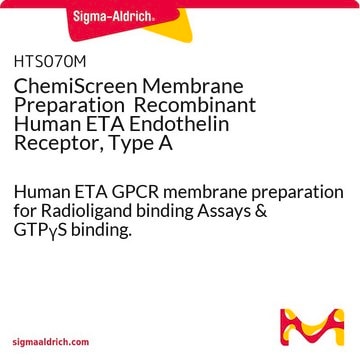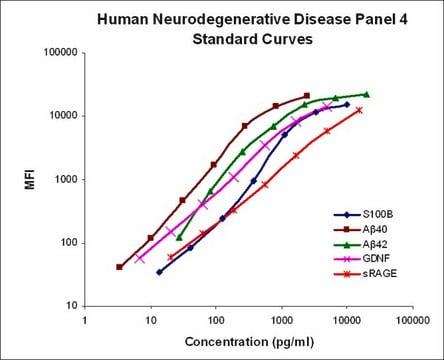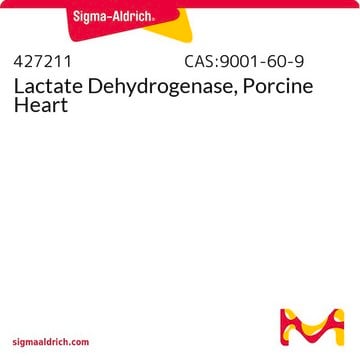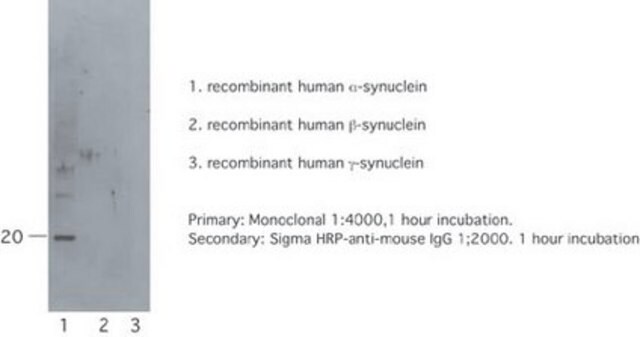HTS139M
ChemiSCREEN Membrane Preparation Recombinant Human sst5 Somatostatin Receptor
Human sst5 GPCR membrane preparation for Radioligand binding Assays & GTPγS binding.
Zaloguj sięWyświetlanie cen organizacyjnych i kontraktowych
About This Item
Kod UNSPSC:
41106514
eCl@ss:
32161000
NACRES:
NA.84
Polecane produkty
pochodzenie biologiczne
human
Poziom jakości
rekombinowane
expressed in Chem-1 cells
producent / nazwa handlowa
ChemiScreen
Chemicon®
metody
ligand binding assay: suitable (GTPγS)
radioligand binding assay (RLBA): suitable
numer dostępu NCBI
numer dostępu UniProt
Warunki transportu
dry ice
Opis ogólny
Full-length human SSTR5 cDNA encoding sst5
Somatostatin (sst) is a multifunctional peptide with two biologically active forms, sst-14 and sst-28, which are synthesized in neurons throughout the brain as well as in peripheral tissues such as the pancreas and the gut (Gillies, 1997). SST exerts a diverse array of effects that include inhibition of endocrine secretion, modulation of neurotransmission, and regulation of cell proliferation by stimulating a family of five G-protein-coupled receptors. Somatostatin receptor sst5 is an inhibitory G protein-coupled receptor that exerts a strong cytostatic effect on various cell types. In mice, sst5 mediates inhibition by somatostatin of pancreatic insulin secretion and contributes to the regulation of glucose homeostasis and insulin sensitivity (Strowski et al. 2003). In addition, deficiency of sst5 leads to subtype-selective sexually dimorphic changes in the expression of both brain and pancreatic somatostatins (Ramirez et al. 2004). Millipore′s sst5 membrane preparations are crude membrane preparations made from our proprietary stable recombinant cell lines to ensure high-level of GPCR surface expression; thus, they are ideal HTS tools for screening of agonists and antagonists of sst5. The membrane preparations exhibit a Kd of 1.2 nM for [125I]-Somatostatin 14. With 0.5 nM [125I]-Somatostatin 14, 5 μg/well sst5 Membrane Prep typically yields greater than 10-fold signal-to-background ratio.
Zastosowanie
Human sst5 GPCR membrane preparation for Radioligand binding Assays & GTPγS binding.
Radioligand binding assay and GTPγS binding.
Działania biochem./fizjol.
GPCR Class: A
Protein Target: sst5
Target Sub-Family: Somatostatin
Jakość
Table 1. Signal:background and specific binding values obtained in a competition binding assay with varying amounts of sst5 Receptor membrane prep.
SPECIFICATIONS: 1 unit = 5 µg membrane preparation
Bmax for [125I]-Somatostatin binding: 10.4 pmol/mg protein
Kd for [125I]-Somatostatin binding: ~1.2 nM
| 10 µg/well | 5 µg/well | |
|---|---|---|
| Signal:Background | 15.2 | 15.7 |
| Specific Binding (cpm) | 25710 | 21425 |
SPECIFICATIONS: 1 unit = 5 µg membrane preparation
Bmax for [125I]-Somatostatin binding: 10.4 pmol/mg protein
Kd for [125I]-Somatostatin binding: ~1.2 nM
Charakterystyka techniczna
Inucbation Conditions
RECOMMENDED ASSAY CONDITIONS: Membranes are mixed with radioactive ligand and unlabeled competitor (see Figures 1 and 2 for concentrations tested) in binding buffer in a nonbinding 96-well plate, and incubated for 1-2 h. Prior to filtration, an FC 96-well harvest plate (Millipore cat. # MAHF C1H) is coated with 0.33% polyethyleneimine for 30 min, then washed with 50mM HEPES, pH 7.4, 0.5% BSA. Binding reaction is transferred to the filter plate, and washed 3 times (1 mL per well per wash) with Wash Buffer. The plate is dried and counted.
Binding buffer: 50 mM Hepes, pH 7.4, 5 mM MgCl2, 1 mM CaCl2, 0.2% BSA, filtered and stored at 4°C
Radioligand: [125I]-Somatostatin 14. (Perkin Elmer#:NEX-389 )
Wash Buffer: 50 mM Hepes, pH 7.4, 500mM NaCl , 0.1% BSA, filtered and stored at 4°C.
One package contains enough membranes for at least 200 assays (units), where a unit is the amount of membrane that will yield greater than 10-fold signal:background with 125I labeled somatostatin 14 at 0.5 nM.
RECOMMENDED ASSAY CONDITIONS: Membranes are mixed with radioactive ligand and unlabeled competitor (see Figures 1 and 2 for concentrations tested) in binding buffer in a nonbinding 96-well plate, and incubated for 1-2 h. Prior to filtration, an FC 96-well harvest plate (Millipore cat. # MAHF C1H) is coated with 0.33% polyethyleneimine for 30 min, then washed with 50mM HEPES, pH 7.4, 0.5% BSA. Binding reaction is transferred to the filter plate, and washed 3 times (1 mL per well per wash) with Wash Buffer. The plate is dried and counted.
Binding buffer: 50 mM Hepes, pH 7.4, 5 mM MgCl2, 1 mM CaCl2, 0.2% BSA, filtered and stored at 4°C
Radioligand: [125I]-Somatostatin 14. (Perkin Elmer#:NEX-389 )
Wash Buffer: 50 mM Hepes, pH 7.4, 500mM NaCl , 0.1% BSA, filtered and stored at 4°C.
One package contains enough membranes for at least 200 assays (units), where a unit is the amount of membrane that will yield greater than 10-fold signal:background with 125I labeled somatostatin 14 at 0.5 nM.
Postać fizyczna
Liquid in packaging buffer: 50 mM Tris pH 7.4, 10% glycerol and 1% BSA no preservatives.
Packaging method: Membranes protein were adjusted to 1 mg/ml in 1 ml packaging buffer, rapidly frozen, and stored at -80°C
Packaging method: Membranes protein were adjusted to 1 mg/ml in 1 ml packaging buffer, rapidly frozen, and stored at -80°C
Przechowywanie i stabilność
Maintain frozen at -70°C for up to 2 years. Do not freeze and thaw.
Informacje prawne
CHEMICON is a registered trademark of Merck KGaA, Darmstadt, Germany
Oświadczenie o zrzeczeniu się odpowiedzialności
Unless otherwise stated in our catalog or other company documentation accompanying the product(s), our products are intended for research use only and are not to be used for any other purpose, which includes but is not limited to, unauthorized commercial uses, in vitro diagnostic uses, ex vivo or in vivo therapeutic uses or any type of consumption or application to humans or animals.
This page may contain text that has been machine translated.
Kod klasy składowania
10 - Combustible liquids
Klasa zagrożenia wodnego (WGK)
WGK 2
Certyfikaty analizy (CoA)
Poszukaj Certyfikaty analizy (CoA), wpisując numer partii/serii produktów. Numery serii i partii można znaleźć na etykiecie produktu po słowach „seria” lub „partia”.
Masz już ten produkt?
Dokumenty związane z niedawno zakupionymi produktami zostały zamieszczone w Bibliotece dokumentów.
Nasz zespół naukowców ma doświadczenie we wszystkich obszarach badań, w tym w naukach przyrodniczych, materiałoznawstwie, syntezie chemicznej, chromatografii, analityce i wielu innych dziedzinach.
Skontaktuj się z zespołem ds. pomocy technicznej








